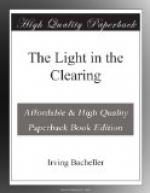A week later we had our raising. Uncle Peabody did not want a public raising, but Aunt Deel had had her way. We had hewed and mortised and bored the timbers for our new home. The neighbors came with pikes and helped to raise and stay and cover them. A great amount of human kindness went into the beams and rafters of that home and of others like it. I knew that The Thing was still alive in the neighborhood, but even that could not paralyze the helpful hands of those people. Indeed, what was said of my Uncle Peabody was nothing more or less than a kind of conversational firewood. I can not think that any one really believed it.
We had a cheerful day. A barrel of hard cider had been set up in the dooryard, and I remember that some drank it too freely. The he-o-hee of the men as they lifted on the pikes and the sound of the hammer and beetle rang in the air from morning until night. Mrs. Rodney Barnes and Mrs. Dorothy came to help Aunt Deel with the cooking and a great dinner was served on an improvised table in the dooryard, where the stove was set up. The shingles and sheathes and clapboards were on before the day ended.
When they were about to go the men filled their cups and drank to Aunt Deel.
I knew, or thought I knew, why they had not mentioned my Uncle Peabody, and was very thoughtful about it. Suddenly the giant Rodney Barnes strode up to the barrel. I remember the lion-like dignity of his face as he turned and said:
“Now, boys, come up here an’ stand right before me, every one o’ you.”
He ranged them in a circle around the barrel. He stood at the spigot and filled every cup. Then he raised his own and said:
“I want ye to drink to Peabody Baynes—one o’ the squarest men that ever stood in cowhide.”
They drank the toast—not one of them would have dared refuse.
“Now three cheers for the new home and every one that lives in it,” he demanded.
They cheered lustily and went away.
Uncle Peabody and I put in the floors and stairway and partitions. More than once in the days we were working together I tried to tell him what Sally had told me, but my courage failed.
We moved our furniture. I remember that Uncle Peabody called it “the houseltree.” We had greased paper on the windows for a time after we moved until the sash came. Aunt Deel had made rag carpets for the parlor and the bedroom which opened off it. Our windows looked down into the great valley of the St. Lawrence, stretching northward thirty miles or more from our hilltop. A beautiful grove of sugar maples stood within a stone’s throw of the back door.
What a rustic charm in the long slant of the green hill below us with its gray, mossy boulders and lovely thorn trees! It was, I think, a brighter, pleasanter home than that we had left. It was built on the cellar of one burned a few years before. The old barn was still there and a little repairing had made it do.




